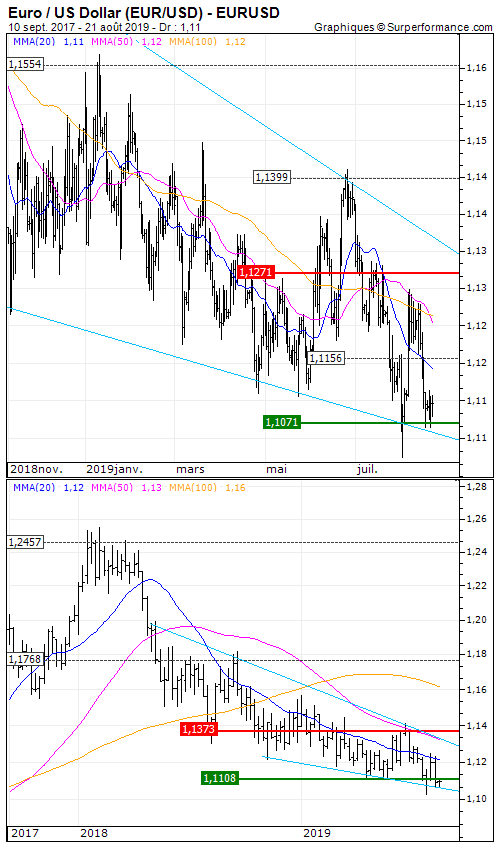Euro / US Dollar (EUR/USD) : To the great evils the great remedies
By Mathieu Burbau
In Italy, Matteo Salvini has exploded the governing coalition and threatened the third economy of the Monetary Union with a return of the far right to power, a scenario largely put forward by the dopinion investigations. Prime Minister Giuseppe Conte has resigned. However, a possible "institutional" agreement between Matteo Renzi's Democratic Party (centre-left) and the 5-star Movement could thwart the plans of the League's leader by offering an alternative to the organization of new elections.
On the Brexit front, Boris Johnson multiplied European provocations and declarations, pretending not to fear a no deal on 31 October. However, the long-awaited parliamentary reopening on 3 September in the United Kingdom could redistribute the cards and put the Prime Minister in the spotlight. Angela Merkel also suggested that Berlin was thinking about "practical solutions" to the Irish safety net, the hypocentre of Westminster's blocking of Theresa May's agreement.
In Germany alone, GDP contracted by 0.1% in the second quarter, threatening the engine of the European economy with a technical recession in the event of a negative Q3 score. But in the meantime, press reports suggest that the country could release an envelope of 50 billion euros and return to a deficit budget in the event of a crisis.
The ECB is also preparing to bring out heavy artillery. According to Olli Rehn, member of the monetary institution, it is important to develop "an important and effective set of measures for September". The Governor of the Bank of Finland argues that it is better to "exceed" market expectations than to be "below".
On the other side of the Atlantic and in the meantime Jackson Hole, Donald Trump is twisting against the FED, like an automaton close to implementation. Under his peroxidized hair, the 45th President of the United States once again believes that the country would experience "strong growth" if Jerome Powell agreed to lower rates further. "It is the strongest dollar in history," he even launched into a shameless lie that could almost be described as a wilful lie if his fan club did not like to sabotage the most fallacious arguments so much.
Graphically, the Euro rallied 1.1071 USD for the second time this year, but barely conceals its hesitations at a time when a new technical rebound is taking time to emerge. However, the reaction of officials to the threats facing the Nineteen leads us to believe that the pair could temporarily consolidate, pending a probable ECB offensive next month. It thus seems wiser to wait for a potential retracement at the contact of 1.1271 to reposition itself as a seller in the direction of the underlying trend.




